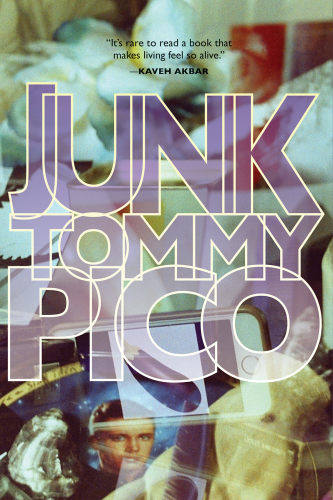
Junk
کتاب های مرتبط
- اطلاعات
- نقد و بررسی
- دیدگاه کاربران
نقد و بررسی

Starred review from February 15, 2018
Replete with street talk, this third book in a trilogy (followingNature Poem and IRL) is a stream-of-consciousness riff on junk and all its meanings, continuing to explore Pico's character Teebs in what could be a love poem or a break-up poem or both. It's written in couplets as one long poem, racing forward because Pico uses little punctuation, which gives readers little chance to rest. Whether the result is a meditation for the modern gay man or a manifesto on the treatment of Native Americans and the disenfranchised, junk becomes a character, along with Janet Jackson, Shonda Rhimes and Cindy Crawford. Junk could be detritus or something worthless or male genitalia. Or is "Junk: a relief map of yr traumas"? Maybe it's "the space between utility." Or "to remove Junk is an upgrade Poverty is like this: / you keep everything until the wheels fall off and then you eat/ the wheels." In the end, Pico says, "Junk is letting go...Junk finds a new boo...We lie quiet in the buff, not touchin." VERDICT An ambitious and impressive work, using visceral language, that will appeal to a wide range of readers.--Karla Huston, Appleton, WI
Copyright 2018 Library Journal, LLC Used with permission.

Starred review from March 19, 2018
Pico (Nature Poem) concludes his stellar “Teebs” trilogy in this frenetic book-length poem, a visceral exorcism of personal and collective demons. He draws formal inspiration from A.R. Ammons’s Garbage, but “Junk isn’t/ garbage It’s not outlived its purpose.” Pico litters his text with physical, emotional, and psychological detritus: “A collision of corn dog bites and/ chunky salsa to achieve a spiritual escape velocity,” thrift store miscellanea, and the baggage of lost loves. The poem is also driven by pop culture references (Janet Jackson is the work’s patron saint); commentary on gay hookup culture; and allusions to such world events as the Syrian refugee crisis, the 2016 shooting at Orlando’s Pulse nightclub, and the water protectors’ uprising at Standing Rock. These references build into an apocalyptic crescendo via Pico’s propulsive fervor, junk piling on junk. Junk also doubles as metaphor for the psychic state of terror one experiences as a target of persecution, in Pico’s case, as a gay “NDN.” “I’m from a place where ppl became/ garbage,” he writes. “Poverty is like this:/ you keep everything until the wheels fall off and then you eat// the wheels.” The poem is a therapeutic process for poet and reader alike; Pico demonstrates that a person’s many selves, traumas, anxieties, hookups, and breakups can become a marker of courage and survival.

























دیدگاه کاربران